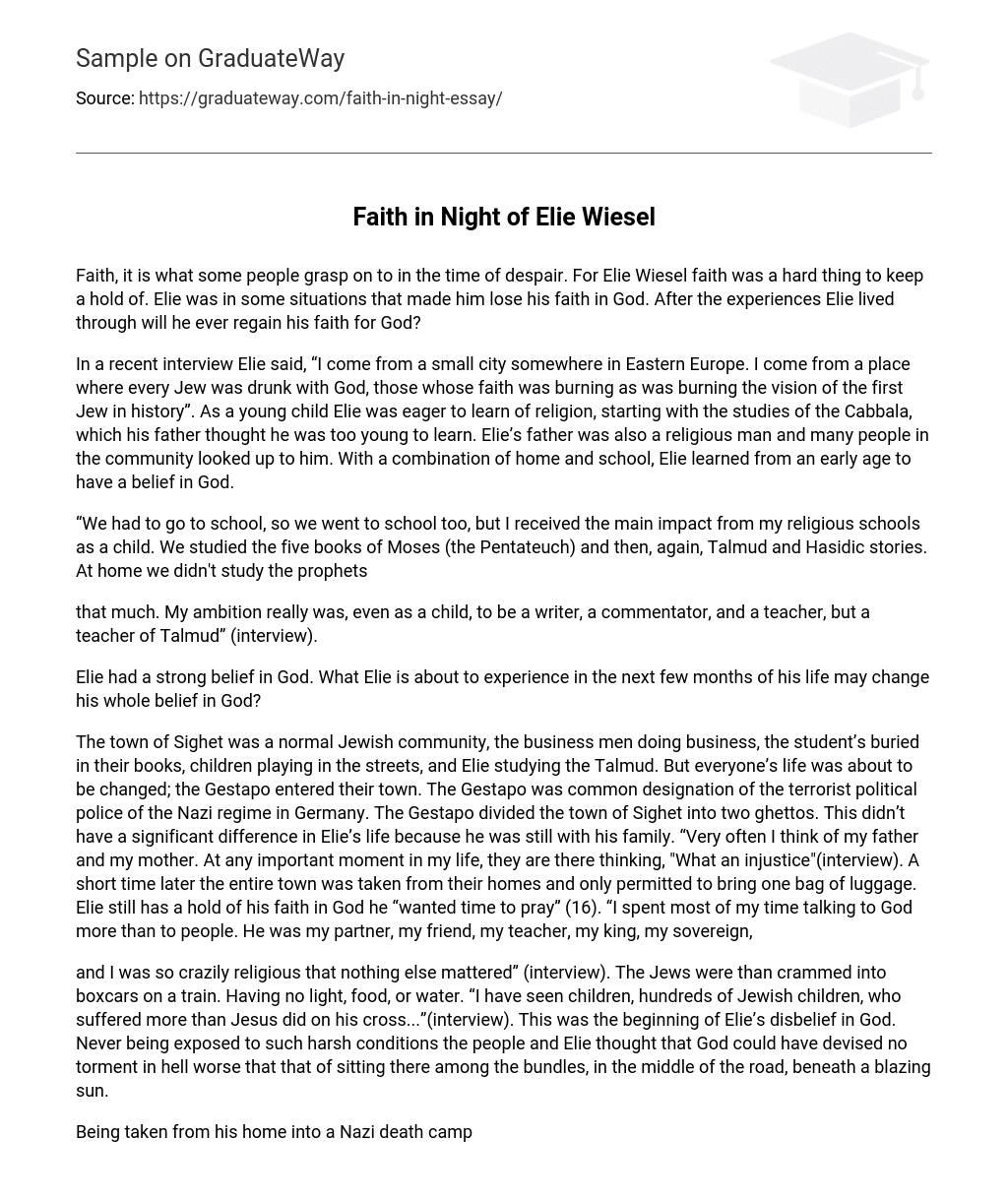In the face of despair, individuals often seek comfort in their faith. Yet, Elie Wiesel grappled with maintaining his belief in God despite the difficulties he encountered. Can he recover his faith following such immense hardships?
In a recent interview, Elie discussed his background and upbringing, revealing that he came from a small city in Eastern Europe where every Jew was deeply religious. Their faith shone brightly, reminiscent of the first Jew in history. From a young age, Elie had an insatiable curiosity about religion. Despite his father’s belief that he was too young for such knowledge, Elie continued his journey by studying the Cabbala. His father, also devout, commanded great respect within their community. Through education at home and school, Elie developed a strong belief in God.
As a child, both my religious schools and regular school education impacted my learning. Specifically, I studied the five books of Moses (the Pentateuch) as well as Talmud and Hasidic stories. However, at home, we did not focus on studying the prophets.
Even as a child, my ambition was to be a writer, a commentator, and a teacher – specifically, a teacher of Talmud” (interview).
Elie’s strong belief in God may be completely altered by the events he is about to encounter in the coming months.
The town of Sighet was a normal Jewish community, with business men conducting their affairs, students engrossed in their studies, and children playing in the streets. Even Elie, devoted to studying the Talmud, was leading a regular life. However, everything was about to change when the Gestapo, the terrorist political police of the Nazi regime in Germany, arrived in their town. The Gestapo divided Sighet into two ghettos, but this did not have a significant impact on Elie’s life as he was still with his family. Despite the turmoil, Elie always had his parents in his thoughts, feeling their presence at important moments and recognizing the injustice they were enduring. Soon after, the entire town was forcibly removed from their homes and allowed to bring only one bag of luggage. Elie clung to his faith in God and desired time to pray. He confessed that he spent more time conversing with God than with people, considering Him his partner, friend, teacher, and sovereign king.
Elie, in an interview, expressed his unwavering dedication to his religious beliefs, so much so that nothing else held significance. The Jews were then forcefully packed into train boxcars without light, sustenance, or hydration. Elie witnessed numerous Jewish children who endured suffering surpassing that of Jesus on the cross. It was during this period when Elie’s belief in God started to diminish. Those individuals, including Elie, who had never experienced such severe conditions could not comprehend a torment more agonizing than being seated amidst bundles on the road under the blazing sun.
Elie was deeply affected emotionally when he was taken from his home to a Nazi death camp, especially because it occurred during his teenage years. In an interview, Elie mentioned that he entered the camp at 15 and left at 16. During this critical period of his life, Elie felt confused and rebellious. He questioned why he should praise God’s name when God remained silent and allowed such terrible events to happen. Witnessing his father being beaten and losing half of his family further diminished Elie’s faith in God. The challenges he faced in the death camps were not only physical but also profoundly emotional.
Elie’s life was greatly impacted by the experiences he underwent, which shattered his beliefs and led him to question religion. Such situations can profoundly affect a person, especially in terms of their perception of God as they age.
Elie reflects on his childhood after the Holocaust, affirming that it was filled with love, hope, faith, and prayer (interview). However, after the war, he remained silent for ten years as he grappled with the profound impact it had on him. Elie reveals that discussing his own experiences is difficult for him and prefers to speak about others (interview). By sharing the stories of others, Elie strives to aid comprehension of the Holocaust. It took him a decade to gather the strength and restore his faith in order to talk about the horrors of the Nazi death camps.
After a decade of silence, a Jewish person named Elie was influenced by a Catholic writer called Mendès-France to start speaking. Mendès-France, who had a deep love for Jesus and possessed honesty and integrity, solely spoke about Jesus.
The impact of one person on me was significant and long-lasting, leading me to pursue careers as both a writer and a teacher. Although my teaching encompasses different subjects and my writing spans various areas, I do specifically write commentaries on the Bible, the Prophets, the Talmud, and Hasidic Masters. In essence, I identify myself as both a writer and a teacher (interview).
Despite the challenges that Elie faced, he did not lose his faith. The Holocaust and the suffering he endured only made his belief in God stronger. In an interview, Elie expressed, “During the war, I question the existence of evil and my faith wavers. However, when I think about those who suffered, my heart is filled with empathy.” Elie Wiesel exemplifies unyielding faith.





